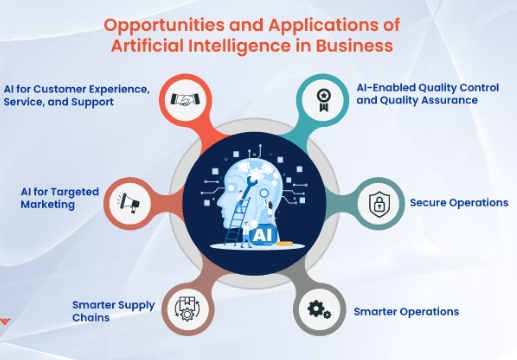
Artificial Intelligence (AI) is revolutionizing the business world by automating processes, enhancing decision-making, and creating new opportunities for innovation. Businesses across industries leverage AI to improve efficiency, customer experiences, and competitiveness. Here’s a comprehensive look at how AI is impacting business:
1. Automation and Operational Efficiency
- Importance: AI automates repetitive and time-consuming tasks, freeing up human resources for strategic activities.
- Impact: Reduces operational costs, increases accuracy, and boosts productivity.
- Examples:
- Robotic Process Automation (RPA): Automates tasks like data entry, invoice processing, and customer onboarding.
- Supply Chain Optimization: AI predicts demand, manages inventory, and optimizes logistics.
2. Enhanced Decision-Making
- Importance: AI analyzes vast amounts of data to provide actionable insights for better decision-making.
- Impact: Helps businesses make data-driven decisions, reducing risks and identifying opportunities.
- Examples:
- Predictive Analytics: AI forecasts market trends and consumer behavior.
- Business Intelligence: AI-powered tools like Power BI and Tableau provide real-time dashboards and insights.
3. Personalized Customer Experiences
- Importance: AI enables businesses to tailor experiences to individual customer preferences.
- Impact: Increases customer satisfaction, loyalty, and sales.
- Examples:
- Chatbots and Virtual Assistants: Provide 24/7 customer support and handle queries efficiently.
- Recommendation Engines: Platforms like Amazon and Netflix suggest products or content based on user behavior.
Artificial Intelligence (AI) in Business: Transforming Operations and Strategy
Artificial Intelligence (AI) is revolutionizing the business world by automating processes, enhancing decision-making, and creating new opportunities for innovation. Businesses across industries leverage AI to improve efficiency, customer experiences, and competitiveness. Here’s a comprehensive look at how AI is impacting business:
1. Automation and Operational Efficiency
- Importance: AI automates repetitive and time-consuming tasks, freeing up human resources for strategic activities.
- Impact: Reduces operational costs, increases accuracy, and boosts productivity.
- Examples:
- Robotic Process Automation (RPA): Automates tasks like data entry, invoice processing, and customer onboarding.
- Supply Chain Optimization: AI predicts demand, manages inventory, and optimizes logistics.
2. Enhanced Decision-Making
- Importance: AI analyzes vast amounts of data to provide actionable insights for better decision-making.
- Impact: Helps businesses make data-driven decisions, reducing risks and identifying opportunities.
- Examples:
- Predictive Analytics: AI forecasts market trends and consumer behavior.
- Business Intelligence: AI-powered tools like Power BI and Tableau provide real-time dashboards and insights.
3. Personalized Customer Experiences
- Importance: AI enables businesses to tailor experiences to individual customer preferences.
- Impact: Increases customer satisfaction, loyalty, and sales.
- Examples:
- Chatbots and Virtual Assistants: Provide 24/7 customer support and handle queries efficiently.
- Recommendation Engines: Platforms like Amazon and Netflix suggest products or content based on user behavior.
4. Marketing and Sales Optimization
- Importance: AI enhances marketing strategies by analyzing consumer data and optimizing campaigns.
- Impact: Improves targeting, reduces ad spend waste, and increases conversion rates.
- Examples:
- Programmatic Advertising: AI automates ad buying and placement in real-time.
- Sentiment Analysis: AI analyzes social media and customer feedback to gauge brand perception.
